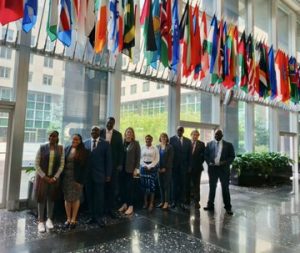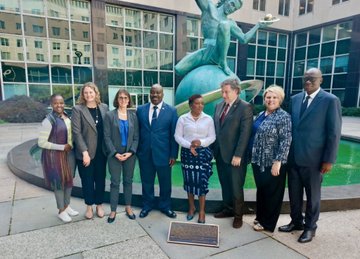By Diana Wenwa
In a significant step towards improving global health security, Cabinet Secretary for Health, Nakhumicha S. Wafula, engaged in high-level discussions with key leaders from the US Department of State, to focus on enhancing global health security and the sustainability of HIV/AIDS programs.
The meeting convened leaders from Global Health Security and Diplomacy as well as the President’s Emergency Plan for AIDS Relief (PEPFAR), emphasizing the crucial role of Universal Health Coverage (UHC) and Community Health Providers (CHPs) in disease prevention and health protection.
The discussions highlighted the importance of UHC in achieving long-term health goals, with particular attention on how it can support and sustain HIV/AIDS programs.
The dialogue with PEPFAR delved into the intersection of UHC and HIV/AIDS program sustainability, considering how comprehensive health coverage can bolster efforts to manage and mitigate the disease.

Representing the US were prominent figures such as Ambassador Dr. John Nkengasong, US Global AIDS Coordinator; Dr. Hillary Carter, Acting Principal Deputy Coordinator for Health Security and Diplomacy; Dr. Rebecca Bunnell, Acting Principal Deputy Coordinator for PEPFAR; Brian Rettmann, PEPFAR Coordinator for Kenya; and Dr. Desmond Williams, Health Attaché at the US Embassy in Nairobi.
Their participation highlighted the US’s strong commitment to supporting global health initiatives and collaborating with countries like Kenya.
From the Kenyan side, the delegation included Nakhumicha S. Wafula, EGH, Cabinet Secretary for Health; Dr. Patrick Amoth, Acting Director General for Health; Prof. Elijah Songok, Acting Director General and CEO of KEMRI; Dr. Erick Muok, Principal Research Scientist at KEMRI; Dr. Jean Gitau, Head of the Division of International Health Relations and Global Health Security; and Justus Bundi.
The meeting demonstrated the robust partnership between Kenya and the US, reinforcing their shared commitment to combating global health threats and enhancing the resilience of health systems worldwide.

